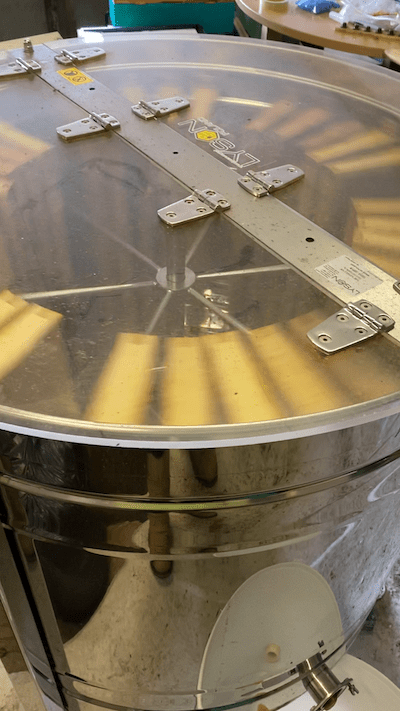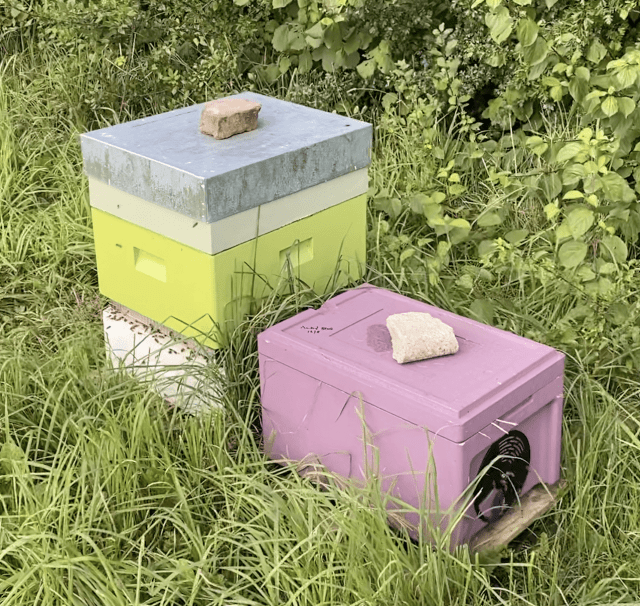
This summer I was going to be staying with Mike & Lesley Palmer in Vermont, followed by a road trip to Toronto via Niagra Falls. Alas COVID intervened. Instead, we bundled into the car (farting beagle too) and drove up to Tighnabruaich, on the Kyles of Bute, Scotland. It’s a regular place for us to have a chilled out holiday. I think it’s the prettiest part of the world that I’ve seen, which is convenient as no flight is required.
Honey Harvest
Anyway, before the holiday I was in a panic to get honey supers off my hives. I managed to do two apiaries and did the third on my return. I didn’t have a great honey harvest; it averaged out to less than one super per production hive. Nothing special, unlike the incredible season Murray McGregor has had on the heather up in Scotland. I think the cold and wet July that we had here held back much of the main summer flow from bramble.

Winter Preparations
I have also managed to get Apivar strips into all of my hives and nucs. It was a bit later than usual because I was hanging on for more honey, but I feel relieved now that it’s done. I’m also feeding invert sugar syrup to the colonies that need it, which is most of them. One jerry can of syrup contains 14KG (31 lbs) of sugar; for some hives, this is enough, but others will need more. They guzzle it down incredibly quickly. I use polystyrene Ashforth style feeders by Swienty, which can stay on over winter as they provide extra insulation.
Wasps, of course
When I left for Scotland, there were sticky supers piled up in my honey room, and I did not clean out the extractor. The piles of supers had a roof on them, and the extractor was closed up. Nevertheless, on my return, I found that the whole room had been invaded by hundreds of wasps. I can’t blame them – they are desperate for sugar now that their nest has no larvae – but I am not a great lover of wasps. I managed to kill them with fly spray and an electric zapper thing, and now I just get the odd one investigating. The honey was sealed away in plastic barrels, and supers were covered, so the quick spray of insecticide won’t be a problem.
Wasps have been loitering around my hives too, but they are mostly being kept at bay by guard bees. In previous years I have used wasp traps, but this year I left them to it. So far, so good, but I might have to put traps out soon.
Systemisation
Now that I have three apiaries, I have come to realise that I need to improve some processes. My Land Rover doesn’t have a tow bar, so I have to move hives or supers in the back of the car. A trailer would help enormously because it could hold more and the bees wouldn’t get inside the car so much. I also need to make a lot more clearer boards, but in my experience, they are not particularly effective anyway. Perhaps I need to leave them on for several days, I’m not sure.
Once it comes to extracting honey, my main problem is uncapping. Those fancy uncapping machines are a bit expensive, and last years experiment with a heated handheld uncapping device did not fill me with confidence. I ended up using an uncapping fork; it works well but takes a while. It would be possible to spend an absolute fortune on equipment. I’m reluctant to do so as I’m not operating at a large enough scale to justify such largesse.
22lbs per hive
This year’s honey is delicious, as always, and I have enough to keep the Donohoe household going for another year. I have a few more supers to extract, after which I expect my harvest to be about 350lbs. I started out in spring with 12 production hives and ended with 20. That’s an average of 16, so I got around 22lbs of honey per colony. Some of the hives were from promoted nucs in July, so they were never likely to produce a crop.
It’s interesting to see which apiaries do well. My newest apiary is looking very promising. My first apiary always does the best, and there’s one that’s always the worst. There doesn’t seem to be any reason for one being better than the other; perhaps it’s to do with the number of other beekeepers nearby. I have yet to learn the mystical art of finding fantastic sites for bees. In my area, beekeepers are everywhere – if anything there are probably too many of us. No chance of honeybees dying out here.

Lots of Nucs
The bees are still bringing in balsam nectar, and presumably, the ivy flow will start soon. In a few weeks, I will make sure that my hives are “heavy like lead” so that I know they will have enough stores to get through winter. The success of next year very much depends on the winter preparations being made right now. Winter bees are being laid, varroa mites are dropping dead due to Apivar, and syrup is being stored in combs around the brood nest. I’m taking plenty of nucs through the winter – twenty in fact – so that I should be able to cope with any losses.
Writing and Editing
In other news, I have been writing a couple of articles for the New Zealand Beekeeper magazine. Also, my first edition of the Cheshire Beekeeper magazine will soon be off to the printer. It is my first as editor, and hopefully not the last! As far as I can tell, despite COVID wrecking association meetings, beekeeping is alive and well in Cheshire. The age of the Zoom meeting is upon us. Whatever happened to Skype?
I’m not sure I agree that Covid is wrecking association meetings Steve … though I’d acknowledge that some of the social side of things, the cuppa and cake are disappearing (perhaps good news for my waist?). However, many associations have really got their act together with some excellent Zoom speaker programmes. And the great thing is that they can get speakers from anywhere – Michael P. can speak here one evening and the following month you could be the speaker at MiddleOfNowhere, Colorado (as long as you’re willing to speak in the middle of the night!). I’ve talked to bigger audiences this ‘winter’ than ever before, with Q&A sessions lasting for an hour at one of them. People seem very engaged and have adapted to the new normal well.
I’m sure that some have been left behind and associations would need to try and bring these people onboard, or provide recordings or whatever. I’m also certain it’s going to be a tough winter/season for new beekeepers.
I’ve done less beekeeping this year than anytime in the last decade. But I’ve had the best season since returning to Scotland 5 years ago … maybe I should ignore them a bit more in the future 😉
Cheers
David
I take your point about Zoom stuff, and our association has plenty of that – all well attended etc. Glad you’ve had a good season 🙂